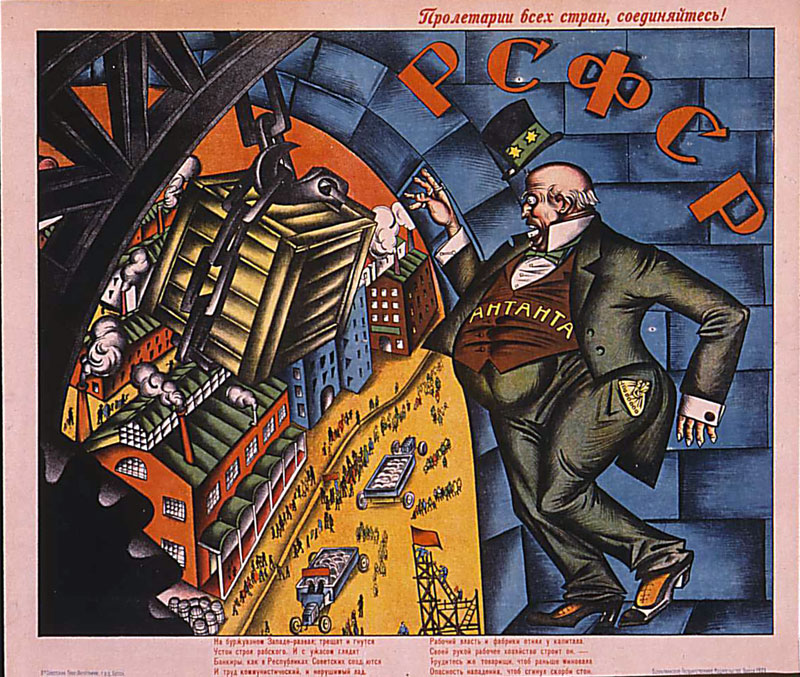
Pictured: A financier shocked as he looks at how efficient the Soviet Union industry is. See more militarization of labor pictures here!
One of the reasons the Bolsheviks prevailed in the Civil War was due to the militarization of labor. “The militarization of labor involved two main processes: converting military units into labor armies, and “mobilizing” industrial workers to carry out particular tasks under quasi-military supervision,” (Militarization of Labor). The Red Army’s plan was to implement this military model to the organization of labor. Commissar of War, Lev Trotsky, oversaw this implementation. “Trotsky comes to the conclusion that socialism needs to employ the “militarization of labor: “The introduction of compulsory labor service is unthinkable without the application, to a greater or less degree, of the methods of militarization of labor,”” (Strategy for Revolution). The mission of these labor armies would give support to areas facing difficulty.
In 1920, his first step was to transform the Third Army to the First Labor Army. The Revolutionary Council, in which Stalin served as the chairman, oversaw the labor army and expanded to other parts of the country, including Ukraine. The new labor army was “assigned duties in mining coal, cutting timber, loading and unloading freight, and clearing road and rail lines,” (Militarization of Labor). Other reorganizations included mobilization of workers, fixing “militarized” enterprises, and fulfilling the areas of labor deficit.
These mobilizations helped the Bolsheviks cover a variety of necessary occupations for production, such as mining, shipbuilding, even shoemakers. The army and labor forces were falling apart, but the militarization of labor drove them together. Trotsky’s knowledge on war and economy led to the success of the labor armies. The militarization also helped the Bolsheviks negotiate the transition from being revolutionaries to being rulers. The militarization used the military to organize the working class, thus leading to a more positive view on the military. In the past, the army had been associated with oppression. The Bolsheviks gained control of the working class, leading them to further embed themselves into Russian government.
Sources:
Militarization of Labor: http://soviethistory.msu.edu/1921-2/militarization-of-labor/
Strategy for Revolution: http://sfr-21.org/trotsky.html
When the Bolsheviks began to implement the militarization of labor it introduced a new lifestyle and regiment into the Russian populations life. Though it was often hard labor and not ideal, it gave the Russians a task that took up their time, time maybe that they would be using to plan revolts and revolutions. However, labor produced products and in the eyes of a deprived country it was progress.
LikeLike
Agreed! I didn’t even think about the time it would take up that could be for planning revolts and revolutions. Although, the militarization of labor was a great change that occurred in the Soviet Union.
LikeLike
I enjoyed your post, I liked the information you included about the tasks of the First Labor Army. I think this was a successful ploy by the Bolsheviks to capture the hearts and minds of many in the working class. I agree that it definitely led to the increased support of a Soviet experiment by workers and soldiers alike. The militarization of labor also served as a great step taken by the Bolsheviks in how they would form their new government, as the military would always play a big role.
LikeLiked by 1 person
I thought the idea of militarizing labor was actually pretty smart on the Bolsheviks. They faced many issues when coming to power, and the social classes were one of them. So by merging the army with the working class, it helped to get rid of the barrier between those classes. How did the working class feel about being organized by the army?
LikeLiked by 1 person
I’ve never been in the army, but I have been a worker and I’m pretty sure I would not appreciate the “militarization of labor”! This might have been a “necessary” policy born of desperation, but it’s hard to imagine that it helped with the campaign to wind hearts and minds….
LikeLike
Agreed with Dr. Nelson. I assume the working class was not pleased with the military stepping in, telling them what to do and how to do it, especially since it is change from activities they have been doing for ages.
LikeLike
You picked a very interesting topic! The Bolsheviks campaigned on Marxist tenets, but this seems very different from Marx’s vision. In the worst case, this could be seen as exploiting the worker. However, as you mentioned, this was a time for the Bolsheviks to transition from revolutionaries to rulers. Ideology can take a back seat for success, especially during a civil war.
LikeLiked by 1 person
I thought this post was very interesting. I found it interesting how the Bolsheviks basically sacrificed their Marxist ideology to win the civil war. This is something that seemed to happen in Russia, as the Soviet state grew, the gap widened and widened. As authoritarian dictators like Stalin became paranoid with staying in power, they strayed farther and farther away from the teachings of Marx.
LikeLike
I find it surprising that the mobilization of labor helped the Bolsheviks rise in power within the government, and was able to better the relationship between the workers and soldiers. If I was a worker, I would not want to be under military supervision. Were there any outspoken workers about how they disagreed with this militarization?
LikeLike
Workers did have resentment towards being taken over by the military. There are comments above this stating workers not wanting to change their daily activities and being taken over by the military.
LikeLike